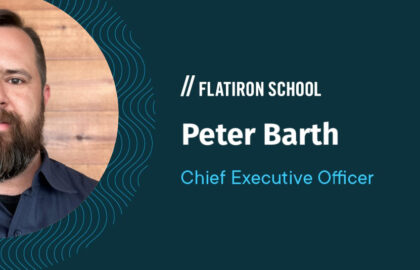Technical interviews can be a great opportunity to show your programming expertise. But whether you’re a beginner or an experienced developer, going into an interview unprepared can be a scary proposition. A first step for getting ready for this phase of your job application process is knowing what to expect in the technical interview—so last week we shared the five types of technical interview formats we’ve seen employers use to test applicants’ problem solving and collaboration skills.
After working with hundreds of employers and preparing Flatiron School students for countless interviews, we’ve learned a thing or two about how to put your best foot forward in the technical interview. Here are three ways you can tackle the technical interview, regardless of which format it takes.
1. Put yourself in the hiring manager’s shoes.

No matter the type of job you’re applying for, remember that, for the hiring manager, the interview is a chance to learn three things about you:
a) Will you perform well in this job? I.e., do you have the skills to thrive in the role, or at least execute the role to a reasonable degree of competence? Will you be able to start contributing from day one and continue learning on the job?
b) Will you work well with the team (which often translates to “Will I be able to work with you?”)? Do you collaborate well? Can you fit in seamlessly to the workflows of the existing team—and get along with the team members, and with me?
c) Do you have the passion and smarts to keep learning on the job? While three months in an immersive coding program can give you the skills to land a developer job, programming is something you spend your whole life learning. Do you have the dedication and capacity to continue learning the craft?
These three things go well beyond testing whether you know how to program. They show the employer what it would be like to actually have you on their team. Be ready to communicate, collaborate, and show curiosity.
2. Use the interview as a chance to learn something.

Keep in mind, in a technical interview you’ll be in a room with a more experienced programmer who has set aside time to talk with you about code—it’s a great opportunity to learn something. Consider this scenario: you’re working through the technical interview and you hit a roadblock—there’s something you don’t know—and you realize you may not move on in the interview process. Right now, some candidates might panic and give up. Should you panic and give up? Far from it. Embrace the challenge. Use this as a chance to learn something. Be engaged, ask the interviewer lots of thoughtful questions, and take advantage of this valuable time with a programmer who knows more than you. Even if you don’t know exactly how to proceed, asking questions can show the interviewer your thought process and how you approach problems. If something truly stumps you during the interview, you can take additional steps beyond talking through your thought process to impress the interviewer: go home, study up on the subject or concept, figure out how to do it, and write a blog post on it that offers tips to other programmers on the subject. Again, even if you don’t know something or don’t have the answer, you can use the opportunity to learn something and demonstrate that you’ve learned something. You never know where that will lead.
3. Find a way to contribute something.
Let’s say you ace the technical portion interview… but so does everyone else (there are a lot of great programmers entering and already in the workforce!). How do you stand out from the pack? Being ready—and hungry—to contribute to the company is one of the most important qualities companies look for in potential employees: it’s what will make you successful in the job, and it’s a very difficult quality for hiring managers to assess in an interview. If you can demonstrate your drive before even working for the company, you’ll be miles ahead other candidates. So how can you show that during the interview? Here’s a great example we share with our students.
When it comes time to ask questions (see tip #2), ask the interviewer what the company’s biggest challenge is when using their preferred framework or database. Then research solutions. Write a blog post about it; create a cool visualization of a problem you solved, deploy it, and send it to them; write and send a thank you note for your front-end interview styled in object-oriented CSS. This is another chance to show your thought process and creativity.
The main takeaway here is that you don’t stop interviewing when you walk out of the room. Not even a little. If you really want to stand out from other applicants, find a way to make a contribution after the fact.
Now, this is all hard work—but you should expect that interviewing is hard work. And even if that hard work doesn’t lead to a job at a given company, it’s still valuable experience: you’ve learned something, you’ve contributed something, you may have built something, and you’ve put yourself in a position to do even better in your next interview.
Interested in learning to code and finding a job in tech? Get started for free with our brand new Bootcamp Prep course.




